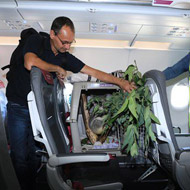
Tanami joins conservation breeding programme at Edinburgh Zoo
An unlikely passenger joined travellers aboard a plane destined for Edinburgh last week.
Nineteen-month-old Queensland koala Tanami had his own seat on the flight from Germany, to join Scotland’s only koalas as part of a conservation breeding programme.
“Koalas are very sensitive animals, so special care needs to be taken when transporting them,” explained Darren McGarry, head of living collections at RZSS Edinburgh Zoo. “They travel in the plane’s cabin and not in the hold so keepers can easily make sure everything’s okay during the flight.”
Tanami travelled more than 700 miles from Duisburg Zoo, one of the largest zoological gardens in Germany. He is swapping place with Edinburgh Zoo’s young male koala, Toorie, who will be making the return flight to Duisburg Zoo later this week.
“We welcome passengers from all over the world to Edinburgh Airport but not all of them are as special or as cute as a koala!” said Gordon Dewar, chief executive of Edinburgh Airport. “It was quite exciting to have Tanami arriving here and he joins a list of famous animals who have touched down here to make Edinburgh Zoo their new home.”
Once a common sight throughout the eucalyptus forests of Eastern Australia, the koala is now listed as ‘vulnerable’ on the ICUN Red List of Threatened Species. Current threats include continued habitat destruction, fragmentation and modification, which makes them vulnerable to predators and vehicle strikes.
Besides being members of the managed breeding programme for Queensland koalas, RZSS Edinburgh Zoo makes regular contributions to support conservation projects in Australia that help rehabilitate sick and injured koalas. It said that visitors can look forward to seeing Tanami in the coming months.
Image (C) RZSS Ediburgh Zoo



 The RCVS has announced a new version of its 1CPD mobile app, with enhanced features for veterinary surgeons and veterinary nurses to record their continuing professional development.
The RCVS has announced a new version of its 1CPD mobile app, with enhanced features for veterinary surgeons and veterinary nurses to record their continuing professional development.